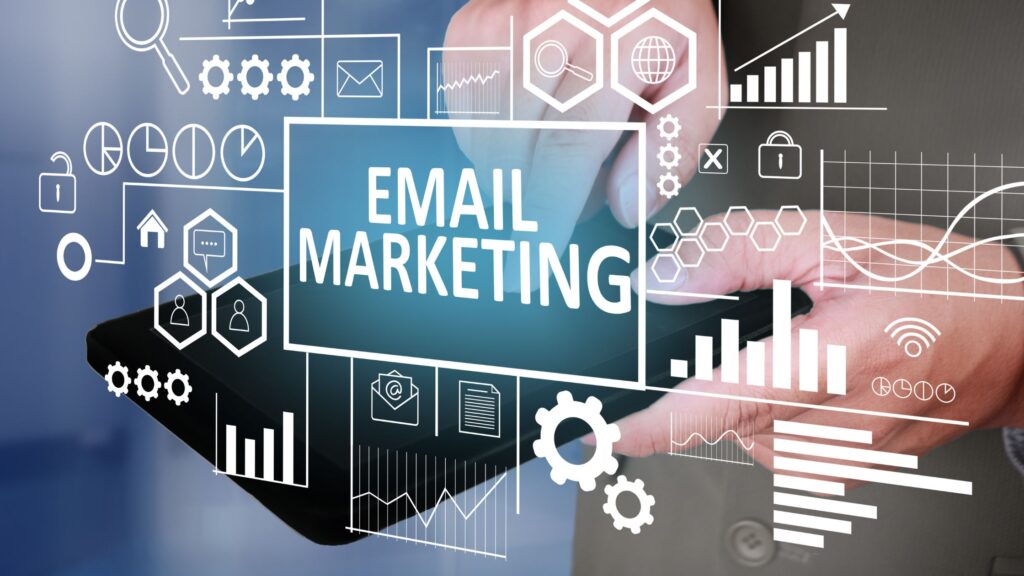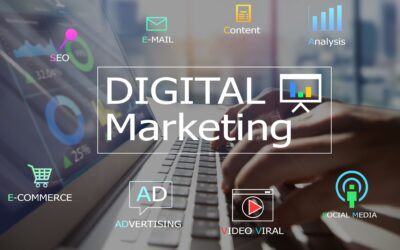In today’s digital age, small businesses need to establish a strong online presence to thrive and succeed. With the vast array of digital marketing channels available, it can be overwhelming to determine the most effective strategies.
In the highly competitive online landscape, digital marketing has become essential for small businesses to stay relevant and competitive. Effective digital marketing strategies can help small businesses increase brand visibility, drive website traffic, generate leads, and ultimately boost sales.
By leveraging the right channels, small businesses can maximize their marketing efforts and achieve significant results. In this article, we will discuss the top five digital marketing channels that have proven to be highly effective for small businesses.
In this article, we will explore the top five digital marketing channels that small businesses can leverage to reach their target audience and drive growth.
Search Engine Optimization (SEO)

- Importance of SEO For Small Businesses
When it comes to online visibility, search engine optimization (SEO) plays a crucial role. SEO focuses on improving a website’s organic ranking on search engine results pages (SERPs). For small businesses, ranking higher in search engine results can significantly increase their chances of attracting relevant organic traffic.
By optimizing their websites for search engines, small businesses can improve their visibility, establish credibility, and drive targeted traffic. And if your business is in Boston then it will be great to find an SEO agency in Boston. Their SEO service is not cheap but affordable with great services.
- On-Page and Off-Page SEO Techniques
To enhance their SEO efforts, small businesses should implement both on-page and off-page optimization techniques. On-page optimization involves optimizing web page elements such as meta tags, headings, content, and URL structure.
Off-page optimization focuses on building high-quality backlinks from reputable websites, social media engagement, and online directory listings. By combining these techniques, small businesses can improve their website’s visibility and increase their chances of ranking higher on search engine results.
- Keyword Research and Optimization
Keyword research is a fundamental aspect of SEO. Small businesses need to identify the keywords and phrases that their target audience is using to search for products or services.
By incorporating these keywords naturally into their website content, small businesses can improve their chances of ranking higher in relevant search queries. Proper keyword optimization can lead to increased organic traffic and better visibility in search engine results.
Pay-Per-Click (PPC) Advertising

- Benefits of PPC Advertising
PPC advertising is an effective digital marketing channel that allows small businesses to display ads on search engines and other platforms. One of the significant benefits of PPC advertising is its immediate impact.
Unlike organic search results, PPC ads appear at the top of search engine results pages, giving small businesses instant visibility. Furthermore, PPC advertising and PPC management agencies offer precise targeting options, allowing businesses to reach their ideal customers based on demographics, interests, and search behavior.
- Creating Effective PPC Campaigns
To create effective PPC campaigns, small businesses should focus on keyword research, ad copywriting, and landing page optimization. Thorough keyword research ensures that businesses are targeting the right keywords and phrases for their ads. Compelling ad copy that highlights unique selling propositions and call-to-action phrases can significantly increase click-through rates.
Additionally, optimizing landing pages to match the ad content and provide a seamless user experience is crucial for converting ad clicks into actual sales or leads.
- Budgeting and Targeting Strategies
Small businesses should carefully plan their PPC budgets to ensure maximum return on investment (ROI) and find a PPC management agency which has some experience. A well-structured budget can help businesses allocate their advertising spend effectively and monitor campaign performance.
In terms of targeting strategies, small businesses can benefit from a combination of broad and specific keyword targeting, remarketing to previous website visitors, and utilizing audience targeting options provided by various advertising platforms.
Social Media Marketing

- Leveraging Social Media Platforms
Social media marketing has revolutionized the way businesses engage with their audience. Small businesses can leverage social media platforms such as Facebook, Instagram, Twitter, and LinkedIn to reach and connect with their target market
By creating engaging and shareable content, small businesses can build brand awareness, increase customer engagement, and drive traffic to their website.
- Building Brand Awareness and Engagement
Social media platforms offer small businesses an opportunity to showcase their brand personality and connect with their audience on a more personal level. By consistently posting relevant and valuable content, small businesses can increase their brand visibility and engage their followers.
Through social media, businesses can also gather valuable insights about their target audience and tailor their marketing strategies accordingly.
- Content Creation and Community Management
Successful social media marketing relies on compelling content creation and effective community management. Small businesses should develop a content strategy that aligns with their brand and resonates with their target audience.
This can include a mix of informational, entertaining, and promotional content. Additionally, actively engaging with followers by responding to comments, messages, and reviews helps to build trust and loyalty among customers.
Email Marketing

- Utilizing Email Campaigns to Reach Customers
Email marketing remains one of the most effective digital marketing channels for small businesses. By building an email subscriber list, businesses can directly communicate with their customers and nurture relationships.
Through targeted email campaigns, businesses can share valuable content, promote products or services, and drive traffic to their website.
- Building Subscriber Lists and Segmentation
Small businesses can build an email subscriber list by offering valuable incentives such as exclusive content, discounts, or giveaways.
By segmenting their subscriber lists based on demographics, preferences, or purchase history, businesses can deliver more personalized and relevant email campaigns. Personalization increases the chances of engagement and conversion, ultimately leading to increased sales and customer loyalty.
- Crafting Compelling Email Content
The success of an email marketing campaign depends on the quality of the email content. Small businesses should focus on crafting compelling subject lines, engaging body content, and clear call-to-action messages. By providing valuable information, solving customer pain points, and offering exclusive deals, businesses can increase open rates, click-through rates, and conversions.
Content Marketing

- Creating Valuable And Relevant Content
Content marketing revolves around creating and distributing valuable and relevant content to attract and engage a target audience.
Small businesses can utilize various forms of content, including blog posts, videos, infographics, and podcasts, to establish their authority in their industry and provide value to their audience. Valuable content helps businesses build trust, increase brand awareness, and drive organic traffic.
- Blogging, Guest Posting, and Content Distribution
Blogging is an effective content marketing strategy that allows small businesses to share their expertise, engage with their audience, and improve their website’s SEO. By consistently publishing high-quality blog posts, businesses can attract organic traffic and position themselves as thought leaders.
Guest posting on reputable websites within the industry further expands their reach and builds backlinks to their website. Content distribution through social media, email marketing, and other channels helps to amplify the reach of the content.
- Establishing Thought Leadership And Driving Traffic
Content marketing enables small businesses to establish themselves as thought leaders in their industry. By consistently delivering valuable and insightful content, businesses can gain credibility and authority, attracting a loyal following of customers and industry professionals. Valuable content also increases the likelihood of social media shares, backlinks, and mentions, driving more traffic to the business website.
Conclusion
In today’s digital landscape, small businesses must utilize effective digital marketing channels to stand out from the competition. By implementing strategies such as SEO, PPC advertising, social media marketing, email marketing, and content marketing, small businesses can maximize their online presence, reach their target audience, and drive growth.
It’s essential for small businesses to adapt and stay up-to-date with the evolving digital marketing landscape to achieve long-term success.
FAQs
How Much Does Digital Marketing Cost for Small Businesses?
The cost of digital marketing for small businesses varies depending on factors such as the chosen channels, campaign objectives, target audience, and competition. It’s recommended to allocate a budget that aligns with the business’s goals and start with a strategy that offers the best ROI.
Which Digital Marketing Channel Has the Highest ROI?
The digital marketing channel with the highest ROI can vary depending on the industry, target audience, and campaign goals. However, channels such as email marketing, SEO, and content marketing are known to provide excellent long-term ROI for small businesses.
How long does it take to see results from digital marketing efforts?
The timeline for seeing results from digital marketing efforts can vary based on various factors, including the competitiveness of the industry, the chosen channels, and the effectiveness of the strategies. It’s important to approach digital marketing as a long-term investment and have realistic expectations for results.
Can Small Businesses Handle Digital Marketing on Their Own?
Small businesses can handle digital marketing on their own, but it requires time, resources, and expertise. Alternatively, they can outsource digital marketing tasks to agencies or hire professionals to help them develop and execute effective strategies.
What Metrics Should Small Businesses Track to Measure Digital Marketing Success?
Small businesses should track metrics such as website traffic, conversions, click-through rates, open rates, engagement rates, and ROI to measure the success of their digital marketing efforts. These metrics provide valuable insights into the effectiveness of campaigns and help identify areas for improvement.

